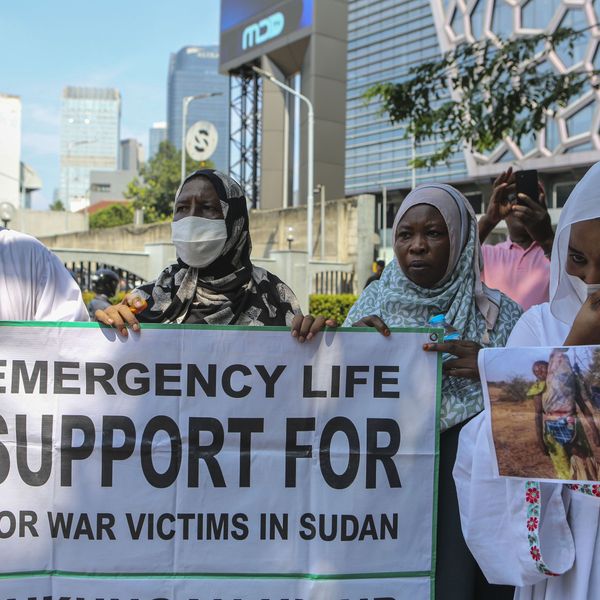Will Haiti Cholera Victims See UN in Court?
Oral argument granted in case seeking compensation for the deadly outbreak brought by UN troops
It's been almost four years since the cholera outbreak began in Haiti following the disastrous earthquake.
Since then, the disease--brought to the Caribbean nation by United Nations troops from Nepal--has claimed the lives of over 8,500 Haitians and sickened over 700,000.
Yet the UN has continued to evade responsibility for the deadly outbreak, and victims have spent years seeking legal redress, including filing a class action lawsuit in federal court in the Southern District of New York demanding UN compensation for the disease that continues its grip on the country. UN Secretary General Ban Ki-moon was personally served court papers in June.
The outbreak, the suit charges, "resulted from the negligent, reckless, and tortious conduct of the Defendants: the United Nations ("UN"); its subsidiary, the United Nations Stabilization Mission in Haiti ("MINUSTAH"); and at least two of their officers." The defendants have a legal obligation to provide redress, the suit says. The United States, however, submitted to U.S. District Judge J. Paul Oetken in March a filing in support of the UN, stating that the body "enjoys absolute immunity."
But the victims' journey towards justice took a positive step on Tuesday when Judge Oetken granted oral argument in the case. The court date is set for Oct. 23 in New York.
Haiti justice advocates are welcoming the development.
Brian Concannon, Executive Director of the Institute for Justice & Democracy in Haiti (IJDH), stated, "The Court's decision to call a hearing shows that it is taking a serious look at the UN's international law obligation to provide victims justice, as a precondition for asserting immunity. The hearing is also an excellent opportunity for discussing the UN's compliance with its obligations, both in court and without."
"It's been nearly 4 years since the UN introduced cholera to Haiti and at long last it seems the hundreds of thousands of victims will get their day in court," stated Jake Johnston, Research Associate with the Center for Economic and Policy Research (CEPR). "It's time for the UN to fully accept its responsibility and redouble efforts to eradicate the disease before there are even more unnecessary deaths."
According to calculations by CEPR's Haiti Relief and Reconstruction Watch, it has been 1444 days since cholera was introduced to Haiti without any apology from the UN.
An Urgent Message From Our Co-Founder
Dear Common Dreams reader, The U.S. is on a fast track to authoritarianism like nothing I've ever seen. Meanwhile, corporate news outlets are utterly capitulating to Trump, twisting their coverage to avoid drawing his ire while lining up to stuff cash in his pockets. That's why I believe that Common Dreams is doing the best and most consequential reporting that we've ever done. Our small but mighty team is a progressive reporting powerhouse, covering the news every day that the corporate media never will. Our mission has always been simple: To inform. To inspire. And to ignite change for the common good. Now here's the key piece that I want all our readers to understand: None of this would be possible without your financial support. That's not just some fundraising cliche. It's the absolute and literal truth. We don't accept corporate advertising and never will. We don't have a paywall because we don't think people should be blocked from critical news based on their ability to pay. Everything we do is funded by the donations of readers like you. Will you donate now to help power the nonprofit, independent reporting of Common Dreams? Thank you for being a vital member of our community. Together, we can keep independent journalism alive when it’s needed most. - Craig Brown, Co-founder |
It's been almost four years since the cholera outbreak began in Haiti following the disastrous earthquake.
Since then, the disease--brought to the Caribbean nation by United Nations troops from Nepal--has claimed the lives of over 8,500 Haitians and sickened over 700,000.
Yet the UN has continued to evade responsibility for the deadly outbreak, and victims have spent years seeking legal redress, including filing a class action lawsuit in federal court in the Southern District of New York demanding UN compensation for the disease that continues its grip on the country. UN Secretary General Ban Ki-moon was personally served court papers in June.
The outbreak, the suit charges, "resulted from the negligent, reckless, and tortious conduct of the Defendants: the United Nations ("UN"); its subsidiary, the United Nations Stabilization Mission in Haiti ("MINUSTAH"); and at least two of their officers." The defendants have a legal obligation to provide redress, the suit says. The United States, however, submitted to U.S. District Judge J. Paul Oetken in March a filing in support of the UN, stating that the body "enjoys absolute immunity."
But the victims' journey towards justice took a positive step on Tuesday when Judge Oetken granted oral argument in the case. The court date is set for Oct. 23 in New York.
Haiti justice advocates are welcoming the development.
Brian Concannon, Executive Director of the Institute for Justice & Democracy in Haiti (IJDH), stated, "The Court's decision to call a hearing shows that it is taking a serious look at the UN's international law obligation to provide victims justice, as a precondition for asserting immunity. The hearing is also an excellent opportunity for discussing the UN's compliance with its obligations, both in court and without."
"It's been nearly 4 years since the UN introduced cholera to Haiti and at long last it seems the hundreds of thousands of victims will get their day in court," stated Jake Johnston, Research Associate with the Center for Economic and Policy Research (CEPR). "It's time for the UN to fully accept its responsibility and redouble efforts to eradicate the disease before there are even more unnecessary deaths."
According to calculations by CEPR's Haiti Relief and Reconstruction Watch, it has been 1444 days since cholera was introduced to Haiti without any apology from the UN.
It's been almost four years since the cholera outbreak began in Haiti following the disastrous earthquake.
Since then, the disease--brought to the Caribbean nation by United Nations troops from Nepal--has claimed the lives of over 8,500 Haitians and sickened over 700,000.
Yet the UN has continued to evade responsibility for the deadly outbreak, and victims have spent years seeking legal redress, including filing a class action lawsuit in federal court in the Southern District of New York demanding UN compensation for the disease that continues its grip on the country. UN Secretary General Ban Ki-moon was personally served court papers in June.
The outbreak, the suit charges, "resulted from the negligent, reckless, and tortious conduct of the Defendants: the United Nations ("UN"); its subsidiary, the United Nations Stabilization Mission in Haiti ("MINUSTAH"); and at least two of their officers." The defendants have a legal obligation to provide redress, the suit says. The United States, however, submitted to U.S. District Judge J. Paul Oetken in March a filing in support of the UN, stating that the body "enjoys absolute immunity."
But the victims' journey towards justice took a positive step on Tuesday when Judge Oetken granted oral argument in the case. The court date is set for Oct. 23 in New York.
Haiti justice advocates are welcoming the development.
Brian Concannon, Executive Director of the Institute for Justice & Democracy in Haiti (IJDH), stated, "The Court's decision to call a hearing shows that it is taking a serious look at the UN's international law obligation to provide victims justice, as a precondition for asserting immunity. The hearing is also an excellent opportunity for discussing the UN's compliance with its obligations, both in court and without."
"It's been nearly 4 years since the UN introduced cholera to Haiti and at long last it seems the hundreds of thousands of victims will get their day in court," stated Jake Johnston, Research Associate with the Center for Economic and Policy Research (CEPR). "It's time for the UN to fully accept its responsibility and redouble efforts to eradicate the disease before there are even more unnecessary deaths."
According to calculations by CEPR's Haiti Relief and Reconstruction Watch, it has been 1444 days since cholera was introduced to Haiti without any apology from the UN.

